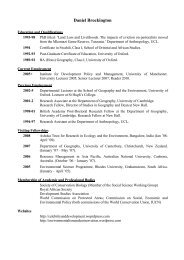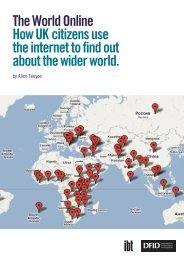World
Viewing the world - Full report
Viewing the world - Full report
- No tags were found...
You also want an ePaper? Increase the reach of your titles
YUMPU automatically turns print PDFs into web optimized ePapers that Google loves.
“It seems that documentaries are a turn-off, whileentertainment and involving, accessible programming isa turn-on” Graham Hinton, Bates UKThe prospects for future output on the developing world“Developing world output should be on the BBC or nichechannels, apart from news. People are not interested.”Carlton UK Sales directors“The onus is on the programme-makers. It could be thatit’s the way the programmes are made that is the problem– too serious, not entertaining enough – or that they areinadequately promoted. It could be that it is the perceptionof foreign programmes rather than the programmesthemselves that is the problem. If there is no change here,and these programmes cannot be popularised they will notstay in the mainstream but will have a future on nichechannels” Graham Hinton, Bates UKSUMMARYCommercial channels are driven ultimately by the salesagenda of their advertisers, who finance the channels andwho demand mass audiences or ‘volume’. The ITCregulators provide a sometimes conflicting pressure intheir efforts to protect programming in the ‘publicinterest’ like news and current affairs, but thecommercial pressures predominate. Output on thedeveloping world gets low ratings and is not desirable inthis climate. It is seen as the preserve of the BBC, Channel4 and niche channels – unless a way is found of makingthem involving and accessible.G.5.5.2. The Distributors’ PerspectivePaul Sowerbutts is Director of Programmes for thetelevision distributor ITEL, and Jane Balfour runs thedistribution company Jane Balfour Films. ITELdistributes mostly factual programmes for UK and USproducers to all countries. Jane Balfour Films distributesfactual, drama and feature films made both in the UKand world-wide. Their opinions were invited on theBritish television industry attitude to programmingabout the developing world.QUANTITY OF PROGRAMMING ABOUT THEDEVELOPING WORLDOverall, both agree there are fewer British programmesmade in this area than in previous years, and fewerbought in. The only exception might be certain currentaffairs strands like Despatches or Correspondent whichcould be making more.WHY THERE ARE FEWER PROGRAMMES“The world has become smaller, so the rest of the world isnot so mysterious and interesting as it was. And peopledon’t like subtitles. Broadcasters have made thedeveloping world something of a ghetto area bymarginalising or cutting the slots. It’s now mainly foundon the niche channels.” Paul Sowerbutts, ITEL“British television has managed to brainwash thegovernment and our whole culture into thinking thatratings are everything. We have trained ourselves intothinking that the only justification for a programme is itsratings. Even the BBC which should be leading,informing, educating, is caught up in this.“It’s a very serious problem because unless you have aninformed audience this is self-progressing. You eliminateaudiences by not educating them.Ten years of showing noforeign language films reduces the audience for them.Foreign language and subtitles have come to be regardedas “intellectual” – that’s why we’e become cut off fromEurope.“Britain has become insular and only wants to see theworld through our own, British eyes. We used to laugh atthe Americans for this, and now we’re nearly there too!We have the technological means to cover the world, butthe content and vision has declined to almost zero.” JaneBalfourSALES POTENTIAL FOR OUTPUT ABOUT THEDEVELOPING WORLDThis is potentially a strong area for sales.“Television, globally, wants more world programming,but British broadcasters and producers are not tuned intothat. We can sell as much developng world programmingas anything else, but we can only sell what broadcastersare making. Into Africa is saleable everywhere; Baby It’sYou, with its multi-cultural approach, sold everywhere.But these are rare. The last UK anthropology coproductionwe did was Nomads, seven years ago, but themarket’s changed so much there’s no chance of ourgetting a series like that now.” Paul Sowerbutts, ITEL“Hard-hitting international current affairs films likeJohn Pilger’s ones always sell well, but there aren’t manymade now. And films that tug at the heart-strings also dowell, like the one about Chinese orphans, or Thai childprostitution.” Jane Balfour172 DFID – July 2000





